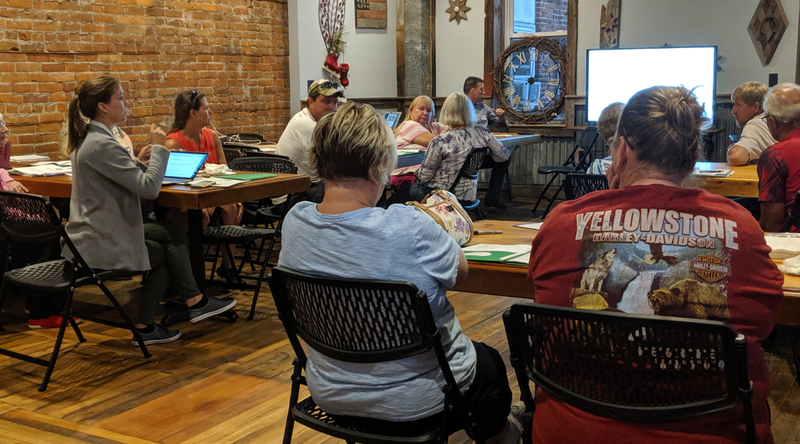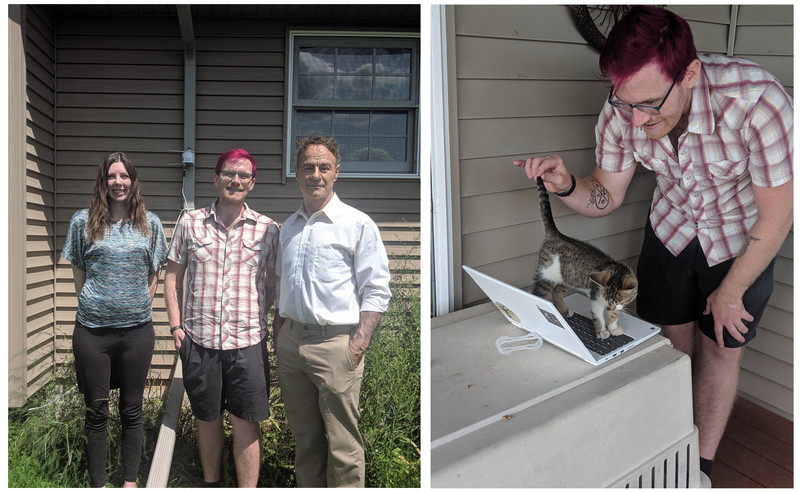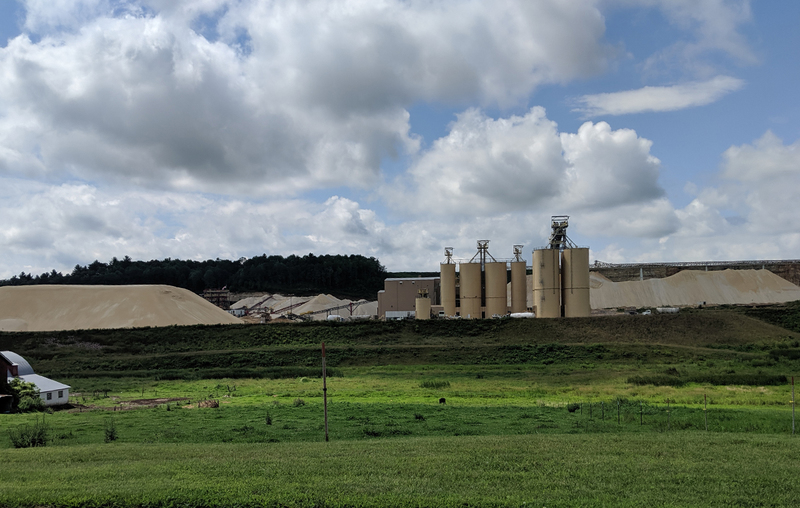Last month, I joined Public Lab’s Director of Community Development, Stevie Lewis (@stevie), for a pair of workshops in southeast Wisconsin for people impacted by the frac sand mining industry. Along with local environmental activists Pat Popple (@pat) and Sheila Danielson, we walked community members through the process of reporting violations by the frac sand industry. These materials are collected here for the public.
At the first meeting in Whitehall, we were joined by about 25 community members who shared their experiences as the frac sand mining industry has encroached on their towns. As mines and processing plants moved into the region, residents have been subjected to unbelievable torments: hauling trucks and train cars running all day and night, blasting happening just yards from their properties — cracking foundations and sheetrock, and damaging wells used for drinking water. One family had been without drinking water for over a year because of damage to their well. Another family had radon poisoning because of cracks in their home’s foundation.
 Community workshop in Whitehall
Community workshop in Whitehall
Led by Pat and Stevie, we walked through the types of permit violations that can be reported, the documentation that needs to be collected, and where to report to. Residents worked in groups on sample violations and the feedback was overwhelmingly positive; the reporting process was easier than most people assumed. Much of the information that was shared was compiled from the work done by Public Lab fellow Lemmy Kamau (@kamau19), who researched Wisconsin state policies related to frac sand mining so people can cite specific laws and codes that are violated.
After the event, I spoke with a woman named Diane who shared about the constant torment from a frac sand mine that is within yards of her property. The noise from the sand processing and trucks goes around the clock, less than 50 yards from her home. Stadium lights shine in her windows all night long. She said that the noise is so unbearable and there is so much particulate matter in the air that she doesn’t dare leave her windows open, and she has audiobooks and music playing constantly to help drown out the sound. She also spoke of the effects the industry has had on relationships in town. “People need to understand that if they hear of these things coming to their area, they need to take it seriously,” said Diane. “This has ripped our community apart.”
Later that week, we tagged along with Dr. Crispin Pierce (@crispinpierce) and students Connor Barnes (@Cbarnes9) and Aleah Gmeiner-Anderson (@Aleah) from the University of Wisconsin-Eau Claire as they installed Purple Air monitors at the homes of community members who live near frac sand mines. We watched as they set up these inexpensive sensors and showed residents how to track levels of particulate matter online. Some residents have begun tracking sand mines near them (blasting, transporting, etc.) and lodging them alongside changes in particulate matter captured and published by the Purple Air monitors. Not only is Purple Air data hosted online for residents and Dr. Pierce’s team to see, but the data streams were recently added to the Wisconsin Department of Natural Resources’ website that collects information on air monitoring.
 Installing Purple Air monitors in the field with (L-R) Aleah Gmeiner-Anderson, Connor Barnes, and Dr. Crispin Pierce (and a kitty named Sprinkles who came to help)
Installing Purple Air monitors in the field with (L-R) Aleah Gmeiner-Anderson, Connor Barnes, and Dr. Crispin Pierce (and a kitty named Sprinkles who came to help)
That evening, we met with about 45 community members in Black River Falls. The session kicked off with a presentation from Aleah and Connor about their ongoing work with air sensors and particulate matter. We again shared information on how to report violations in the frac sand industry and took questions about nuisance complaints.
 Community workshop in Black River Falls
Community workshop in Black River Falls
At the meeting, I also spoke with Dwight Swenson (@dswenson), an agricultural educator at UW-River Falls in Plant and Earth Science. He and his wife have lived in their home in the town of Curran in Jackson County for about 25 years. It’s an idyllic, peaceful community tucked between rolling hills. “But when the sand mine came in five years ago, the peace was stolen from us,” he says. Mining operations have since decimated the hills outside their living room windows, lights from the plant shine all night long, and lines of trucks rumble past the property. The processing plant uses a million gallons of water per day, but little is known about the wastewater treatment and the effects on the local waterways and drinking water.
Of particular concern is the amount of silica dust in the air. Dwight and his wife, Ruth, have Purple Air monitors installed in their yard and Ruth takes meticulous notes on the readings and weather conditions each day. The data routinely show particulate levels that are well into the danger zone, but little has been done to hold the mining company accountable. “We're relying on local agencies to protect us and they've largely failed us so far,” says Dwight. Tipped off by a community member, he recently responded to a spill of viscous, mustard-colored liquid in a local river. He traced it up a stream that flows near his home, back to the mining site. Officials from the department of natural resources showed up to investigate, but not until days later. “This whole frac sand mining industry is so fraught with peril in terms of sustainability.” says Dwight. “It divides communities. And the economics just isn’t there. They’re not sustainable and they’re not financially viable.”
 Frac sand mine in Curran, WI
Frac sand mine in Curran, WI

0 Comments
Login to comment.